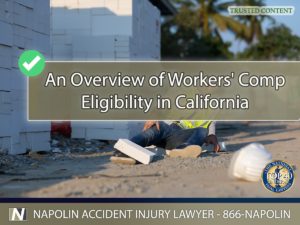An Overview of Workers’ Compensation Eligibility in California
Workers’ Compensation in California serves as a crucial safety net for employees who suffer from job-related injuries or illnesses. This system, governed by the California Labor Code and administered by the Division of Workers’ Compensation, ensures that injured workers receive medical care and compensation for lost wages. Understanding the nuances of eligibility criteria, claim processes, and the types of benefits available is vital for any employee working in California.

Comprehensive Eligibility Criteria for Workers’ Compensation
Comprehensive Eligibility Criteria for Workers’ Compensation
In California, the eligibility for Workers’ Compensation hinges on several key factors. Firstly, the claimant must be an employee, not an independent contractor, as defined under California law. The injury or illness must be work-related, occurring in the course and scope of employment. This includes injuries sustained during work hours, at the workplace, or as a direct result of employment duties. Mental and physical stress-related injuries are also covered, provided they are substantiated with medical evidence.
Detailed Claims Process in California
The process of filing a Workers’ Compensation claim in California is time-sensitive and requires adherence to specific procedures. After sustaining an injury, an employee must report it to their employer within 30 days. The employer is then obligated to provide a Workers’ Compensation Claim Form (DWC-1) within one working day. Once the employee submits the completed form, the employer must forward it to their insurance carrier, initiating the claim process. Failure to meet these deadlines can result in the denial of the claim.
Types and Calculation of Disability Benefits
Workers’ Compensation in California offers two primary types of disability benefits: Temporary Disability (TD) and Permanent Disability (PD). TD benefits are provided when the worker is recovering and are calculated as two-thirds of the injured worker’s average weekly wage, subject to minimum and maximum limits set by the state. PD benefits are for workers whose injuries result in lasting limitations and are determined based on the worker’s disability rating, age, occupation, and diminished future earning capacity.
Right to Medical Treatment Under Workers’ Compensation
California law entitles injured workers to all necessary medical treatment to cure or relieve the effects of a work-related injury. This includes doctor visits, hospital services, physical therapy, and medication. The employer’s Workers’ Compensation insurance is responsible for covering these costs. Disputes over the necessity or extent of medical treatment can be resolved through the Workers’ Compensation Appeals Board.
Handling Claim Denials and Appeals
If a Workers’ Compensation claim is denied in California, the employee has the right to challenge the decision. The first step is to file an Application for Adjudication of Claim with the Workers’ Compensation Appeals Board. The case will then be reviewed, and a hearing may be scheduled. During this process, legal representation can be crucial in effectively presenting the case and navigating the legal complexities.

Understanding Third-Party Liability in Workers’ Comp Cases
Understanding Third-Party Liability in Workers’ Comp Cases
In certain situations, a worker’s injury may be caused by a third party, separate from the employer. In such cases, the injured worker may have the right to file a third-party liability claim in civil court, in addition to the Workers’ Compensation claim. This can include situations like a car accident while on the job, where another driver is at fault, or injuries caused by defective equipment manufactured by another company.
Interplay Between Workers’ Comp and Social Security Disability
In California, receiving Workers’ Compensation benefits can affect the amount of Social Security Disability Insurance (SSDI) benefits an individual is eligible for. The total amount of these benefits combined cannot exceed 80% of the worker’s average current earnings before the disability. Understanding this interplay is crucial to ensure that injured workers receive the maximum benefits they are entitled to under the law.
The Importance of Legal Representation in Workers’ Compensation Claims
Navigating the complexities of Workers’ Compensation claims in California can be daunting. An experienced attorney can provide invaluable assistance in ensuring that all procedural requirements are met, representing the worker in case of disputes or denials, and maximizing the benefits received. Legal representation is particularly crucial in cases involving severe injuries, disputes over the nature of the injury, or when third-party liability is involved.

An Overview of Workers’ Compensation Eligibility in California
An Overview of Workers’ Compensation Eligibility in California
Understanding the intricacies of Workers’ Compensation eligibility and claims in California is essential for any employee. If you have suffered a work-related injury, it is important to seek knowledgeable legal assistance to navigate this complex system. Contact Napolin Accident Injury Lawyer at (909) 962-8415 for a free consultation. Our dedicated team is committed to guiding you through the Workers’ Compensation process, ensuring your rights are protected and you receive the full benefits you deserve under California law.
